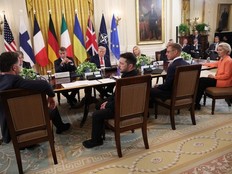New study details heavy toll of Trump tariffs on Ontario's auto sector
"Right now, businesses are just focused on keeping the doors open"

Article content
A study by the Canadian Federation of Independent Business (CFIB) reports the Canada-U.S. trade dispute has resulted in 49 per cent of businesses in Ontario’s automotive sector postponing or cancelling new investments while delivering a double-digit decline in sales.
Since U.S. President Donald Trump’s tariff campaign began in February, Ontario’s small- and medium-size auto firms have scuttled potential investment worth $2.9 billion over the next year.
“Uncertainty, market volatility and increased costs are forcing auto business owners to make difficult decisions to keep their doors open,” said Joseph Falzata, the report’s co-author and CFIB’s policy analyst for Ontario.
“The desire to grow is there, but with such massive revenue losses, businesses are more focused on keeping their doors open than expanding their operations.”
The impact of those lost investments will have a ripple effect across Ontario’s economy.
Falzata said June was the first month since March that those surveyed weren’t going to lay off more people than they hired.
June was a net-zero month for hiring with 15 per cent of firms saying they expected to lay off employees in the next three to four months, matching the percentage intending to hire. The remaining 70 per cent forecast no employment level changes.
“It’s a huge impact,” Falzata said.
“Ontario needs big employers like Stellantis, Ford, GM . . . but those companies also need these smaller suppliers to make their products. Those businesses also support the existence of other non-automotive businesses in cities like Windsor.”
The potential threat is also severe in London, where in 2023 more than 700 businesses exported about $7.8 billion worth of goods to the United States, mostly in automotive and manufacturing but also in food and agriculture, Statistics Canada figures show.
The survey was sent to 500 members of the CFIB and focused on the 187 businesses with fewer than 500 people that were operating in the automotive sector in Canada.
It found that 65 per cent of those businesses were negatively impacted by the tariffs. The average loss of sales to date has been 13 per cent.
“Business confidence is at low levels right now in Canada,” Falzata said. “The last few months it’s an all-time low – lower than during the pandemic, the 2008 financial crisis and even 9/11.”
Falzata added 34 per cent of exporters reported experiencing border delays since the tariff war started. The uncertainty has resulted in the triple threat of a pause in investment, a decline in demand and higher prices for imports.
“Fifty-five percent of (of all types of) businesses report there’s insufficient demand for growth in Ontario,” said Falzata, who noted the paperwork involved in getting products certified as compliant with the Canada-United States-Mexico Agreement trade pact adds another layer of costs.
“Right now, businesses are just focused on keeping the doors open. They’re trying to re-navigate their supply chains to Canadian suppliers or other countries than the U.S.,” Falzata said. “It’s expensive to do that. Businesses said they plan to pass on most if not all those additional costs to consumers.”
Falzata said the CFIB feels government support and some changes to the small business income tax rate are required to help the sector navigate through this period.
However, the $85 million in funding allocated to the Ontario Automotive Modernization Program (O-AMP) and the Ontario Vehicle Innovation Network (OVIN) along with the $50 million set aside for the Ontario Together Trade Fund (OTTF) are expected to be used by only one to two per cent of small auto business owners.
Falzata said requirements of businesses to match government grants or invest up to $200,000 to be eligible for the programs is beyond the reach of most small businesses in the current climate. Being able to demonstrate a 30 per cent loss in revenue is another eligibility hurdle.
“If you’ve lost 30 per cent of your revenue, you’re focused on fighting to keep the doors open and not likely to have $200,000 lying around,” Falzata said.
“Our membership would prefer to see the small business income tax reduced from 3.2 per cent, the highest rate in Canada, to two per cent. Perhaps reducing the revenue decrease to 10 per cent to be eligible would help.”
Falzata said the CFIB also recommends raising the threshold for the lower small business tax rate from the first $500,000 earned to $700,000. “While these programs were created with good intentions, the reality is they miss the mark for small business.”
The organization also recommends the federal government speed up its distribution of tariff money collected on U.S. goods to lessen the effect of the damaging trade war.













Postmedia is committed to maintaining a lively but civil forum for discussion. Please keep comments relevant and respectful. Comments may take up to an hour to appear on the site. You will receive an email if there is a reply to your comment, an update to a thread you follow or if a user you follow comments. Visit our Community Guidelines for more information.